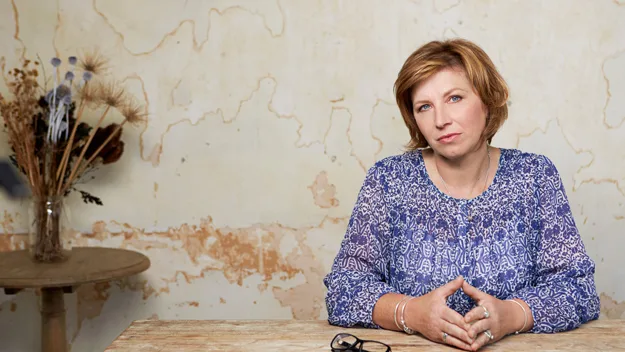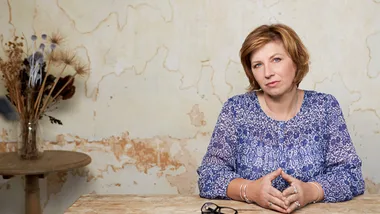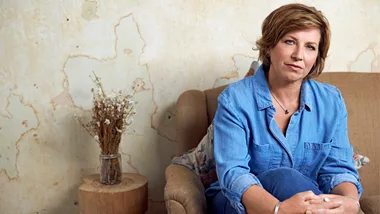Luke Batty slept in his mother’s bed every night. It’s not the kind of thing an 11-year-old boy likes to advertise, so Rosie used to keep it a secret. Luke thought he was too old to cuddle his mum, but he was too scared to sleep alone and needed to know she was near. “He was just there,” says Rosie, “and he’d have his little feet touching my legs.”
Night-time is when the tears come. The early evenings feel desolate – because that’s when Rosie and Luke would come together after their days apart, go to Scouts, football or cricket training, and argue about what was for dinner – but sleeping without her little boy breaks her heart. “That’s the time that’s hard – going to bed,” says Rosie. “I used to every day, even if he was asleep, just kiss his cheek. He was beautiful. They always are, aren’t they?”
Rosie dissolves at the memory, fighting for breath with every word. For a minute or so, she lets the anguish take over as she reflects on all that she’s lost. Luke was murdered by his father on February 12 at after-school cricket practice, in Tyabb on Victoria’s Mornington Peninsula. While Rosie stood just metres away, her former partner, Greg Anderson, hit Luke in the head with a cricket bat and then stabbed him, later menacing police and shrugging off capsicum spray until an officer shot and mortally wounded him.
Not since four-year-old Darcey Freeman was thrown off the West Gate Bridge has the nation reeled at a case of such unspeakable family brutality. Rosie remembers her own horror when she heard about Darcey’s murder at the hands of her father five years ago. “I felt totally sickened and so desperately sad,” she says, “mainly for the two little kids in the back [of the car]. How do you ever as a child move on when you’ve witnessed that from your parent?” Somehow, she says, Luke’s death doesn’t seem as bad as Darcey’s. Perhaps we just choose to find our consolations where we can. “I’d like to think that Luke had no idea what was coming and the blow to the back of the head either pretty much killed him or knocked him to the point where he had no idea what came next,” says Rosie. “He had a great experience beforehand. He was happy.”
If her words on paper make her sound detached, then they do her a disservice – because you cannot meet Rosie and doubt her love for Luke. During a two-and-a-half-hour interview, she breaks down several times, mostly when she recounts her life with Luke and what she’ll miss most. She isn’t emotionless by any means, but there’s an improbable composure about her, possibly because it’s only 21 days since Luke’s murder and she hasn’t absorbed its enormity.
Before the photo shoot begins, she’s upbeat with the crew, texting ahead of her arrival to ask for a coffee to “perk me up” and automatically answering, “Good, thanks”, when someone asks how she is during introductions.
To see it up close, it seems like self-preservation – as if the light-hearted banter and social niceties are helping her keep it together. “I’m sure you go into some kind of shock and your body protects you from what you can’t comprehend,” says Rosie. “I think I’m surprisingly okay. If anyone had ever told me this would happen, I would have thought how would I ever get out of bed or function again?”

Yet Rosie faced the TV cameras less than 24 hours after the murder of her only child and responded without rancour – to the astonishment of everyone who watched her. Instead, she used the platform to advocate for domestic violence victims. Greg had a long history of violence and, on the night he killed his son, there were outstanding warrants for the 54-year old’s arrest, but Rosie resisted the knee-jerk – and entirely understandable – temptation to look for culprits.
The police were just doing their job, she said, while the court system was underfunded and overloaded. Rosie even seemed to forgive her ex-partner, who she believed suffered from an untreated mental illness. Not once did she seek to dehumanise him. It was a “totally selfish act”, she said, but “he wasn’t an evil man” and “no one loved Luke more than Greg”.
She even thought Greg’s access to Luke was fair. Rosie had wanted to maintain a relationship between father and son, and she’d taken every possible precaution. “He never had access to Luke alone and he was never able to take him, and I believe those factors contributed to his sadness.” To those who ask how she can forgive him, Rosie says, “I have a very forgiving nature, not just in relation to Greg. It’s my make-up. I think it’s a real shame that people feel justified in keeping hold of their anger and blame because I do believe that you can’t get on with your life and have a good quality of life while you’re holding onto hatred and anger.”
Rosie extends that same compassion to herself, even though it must be difficult not to torture herself with what-ifs. “I know,” she says, “I did the best I could.” It’s refreshing to meet a woman who doesn’t feel the need to self-flagellate or to fi t some socially acceptable image of the bereaved mother. In the face of such unthinkable horror, she has every cause to be hysterical, but her quiet dignity rarely slips. Even when she does cry, it’s fleeting and contained. And besides, who are we to judge? Just because she doesn’t follow the Hollywood playbook with constant body-wracking sobs doesn’t mean her grief isn’t all-consuming. Surely Lindy Chamberlain taught us that.
Rosie, who grew up in the English village of Laneham, attributes her empathy to her early experience of heartache, with the death of her mother from peritonitis when she was just six. Her father did the best he could, but he was emotionally remote and 52-year-old Rosie has spent her life trying to understand the impact of that early loss. “I always felt back then,” she says, “well, nothing as bad will ever happen again.” Her child’s murder, though, must surely surpass it. “Yeah,” she agrees quietly. “But you’re never given more than you can deal with, so there’s that drive within me that pushes [me] forward.”
She does crumble, though.
In Rosie’s case, her grief bubbles to the surface in the form of anxiety and irritation. She recoils at the “fussy” reactions of some people and the cloying hugs that linger too long. She’s on a razor’s edge and it doesn’t take much to trip her into the abyss. She exploded in a rage the other day when someone turned on the vacuum cleaner and the noise was excruciating. The afternoon before the funeral, she only had a few minutes to find new black shoes and she became frantic in the Myer shoe department. She snapped when she couldn’t get any service and felt manic as she ricocheted around the shelves, looking for any pair that might work.
She is taking sleeping tablets now and has been on anti-anxiety medication for the past 18 months. Going through the court process to bring intervention orders against Greg brought on the anxiety, she says, and Luke seemed to be happy one moment and troubled the next. He was scared at night, replaying horror movies in his head. He slept with the light on, made sure the doors were locked and was worried that someone would stab him, perhaps because one of Rosie’s friends had been stabbed to death in her driveway by an ex-partner.
Says Rosie, “He probably thought that if he was [sleeping] with me, he could stop his dad from hurting me.” Still, Rosie was feeling optimistic about 2014. Greg hadn’t been to her house since January last year (a visit during which he threatened to kill her and cut off her foot) and Rosie felt rejuvenated after a five-week holiday in England over Christmas. Luke, too, had benefited from less time with his father and had told his mother that he didn’t want to see his dad anymore. “He was at the age where he’d become embarrassed that his dad was homeless,” recalls Rosie. “He didn’t want his school friends to know that his dad slept in a car. He wanted his dad to be like other dads.”
An abrasive personality, Greg had become paranoid and unemployable. He had an axe to grind with Luke’s cricket coach and was no longer welcome at football training. Rosie says she had tried for years to have an amicable relationship with him, but it would always end in abuse. Even before Luke was born, she knew he wasn’t a good bet. Rosie, who moved to Australia after backpacking here as a 24-year-old, met Greg around her 30th birthday, when they worked at the same recruitment company. They were on-again, off-again for about two years and then rekindled the relationship when Rosie was 39. She became pregnant soon afterwards. In hindsight, she suspects the ticking of her biological clock became too loud to ignore and she settled for what seemed like the easy option. “I did want it to work,” she says, “and I overlooked some troubling signals because I liked him.”
She never romanticised the father of her child, though; she had a clear-eyed awareness of his deficiencies and wasn’t about to commit to a man who “hadn’t got his shit together”. He did propose – flippantly, in the car – when she was pregnant, but she remembers laughing at the suggestion. They briefly tried to live with each other once, in the months before Luke’s birth, but that’s when Greg’s true character emerged. “He was tall, strong, attractive, he had a funny side,” she says, “but there was a switch.” After Rosie accidentally locked him out of the house one day, he erupted in fury and she came home from work to find he had cut up the slippers she’d given him – a cutesy symbol of them attempting to play house – and taken to her lovingly restored garden bench with a sledgehammer. Rosie refused to let him move in. “He never apologised,” she says. “You never got any remorse out of him. You could never gauge whether he regretted anything … I thought, I know I can’t have a permanent relationship with this man, even though there were elements of him that I cared for deeply.”
All sexual contact with Greg had stopped by the time Luke was one, but she wanted her son to know his father. Although he couldn’t take Luke out, Greg was allowed to visit Rosie’s home to be involved with his baby, to feed and change him. When Luke was three, however, the little boy crept out of his room and witnessed his father’s first physical assault on his mother, when Greg grabbed her by the hair and pinned her against the wall. Luke never forgot it. Rosie’s psychologist told her not to underestimate Greg, she says, and police warned her that he was “a nasty piece of work” and that she had cause to be frightened. It was tempting to escape him by moving back to England, but Luke didn’t want to go. Besides, they were happy here. “He’d become a good little friend,” says Rosie, who recently took Luke to the Grease stage show. “He could be a sensitive kid that was not always easy to deal with, but we always laughed every day. He had these little moves that he did. And in the car, listening to the radio, he wouldn’t let me sing.”
At the end of the year, they were planning to hit the Gold Coast theme parks again. “I made every birthday count,” says Rosie, wearing a bracelet with “LUKE” spelt out in silver charms, “and I made the most of everything.” The night he died, Rosie never got to hold her son or even say goodbye. “I wasn’t allowed to go near him because it was a crime scene,” she says, struggling to speak. “And that’s when I did get a bit upset because I said, ‘That’s my little boy out there, all on his own’, and they said, ‘We’re taking care of him, Rosie, it’s okay’. That was my little boy out there. They said, ‘Rosie, I don’t think you’d want to see him.’”
Later, when she had to identify his body, it was done in the gentlest way possible. After giving a three-hour statement at the police station that night, Rosie finally returned home about six the next morning. “When I got home, I opened a bottle of wine,” she recalls. “I couldn’t tell you how much I drank. I’m not an alcoholic, but I couldn’t tell you when I fell into bed, how I got into bed.” Her memories of the next three days are hazy. Almost everyone she knew filed through her house, while she slept on the living room couch with Luke’s SpongeBob SquarePants pillow, not really registering who was there or what was happening. “At the funeral, I thought to myself, I need to really embrace this and really remember this day, and I got into a zone where you just don’t let yourself go,” she says. “You control it. The time when I nearly lost it was singing Amazing Grace. That was my dad’s favourite hymn.”
Rosie cleaned out Luke’s wardrobe a few days later and thought about all the clothes she had kept since he was a baby. “You’re supposed to look back at those things when they’re 21 or throughout their life and say, ‘This is what you were like when you were a little boy,’” she says through tears. “And now what’s the point in keeping them because I’m just going to look at them and go, Luke was only this big when he died. I know that that will improve, but all the fond memories of him growing up are now tragic memories.”
Now a mother without a child, Rosie wonders where she goes from here. “This house and lifestyle was all about Luke, all for Luke,” she says. “I look across at the trampoline and the cubby house and a swimming pool and paddocks with animals. How do I stay here?” And yet a sense of purpose, it seems, can fortify even the most fragile.
Rosie has been deeply moved by the public support, which has included hundreds of letters, a freezer full of food, gifts of cash and spa vouchers, a personal phone call from Tony Abbott, the Prime Minister, and hugs from strangers in the supermarket. She has also carved out some time for reflection, walking her dogs along the beach and back to the cricket oval where she lost Luke.
Rosie is adamant her son will leave a legacy. More than $40,000 has been raised so far for a project to help child victims of family violence, and an inquest into Luke’s murder will question the way police handle domestic violence cases.
Although Rosie would never have wanted it this way, Luke’s death has given her a voice – and maybe that’s what gets her out of bed each morning when many of us can’t imagine mustering the will to keep going.
“The thing for me now is feeling like I’ve got an opportunity to make some small difference,” says Rosie.
“My life can’t go back to what it was, but it can become an amazing journey – and that’s where I’m quite sure it’s heading.”



